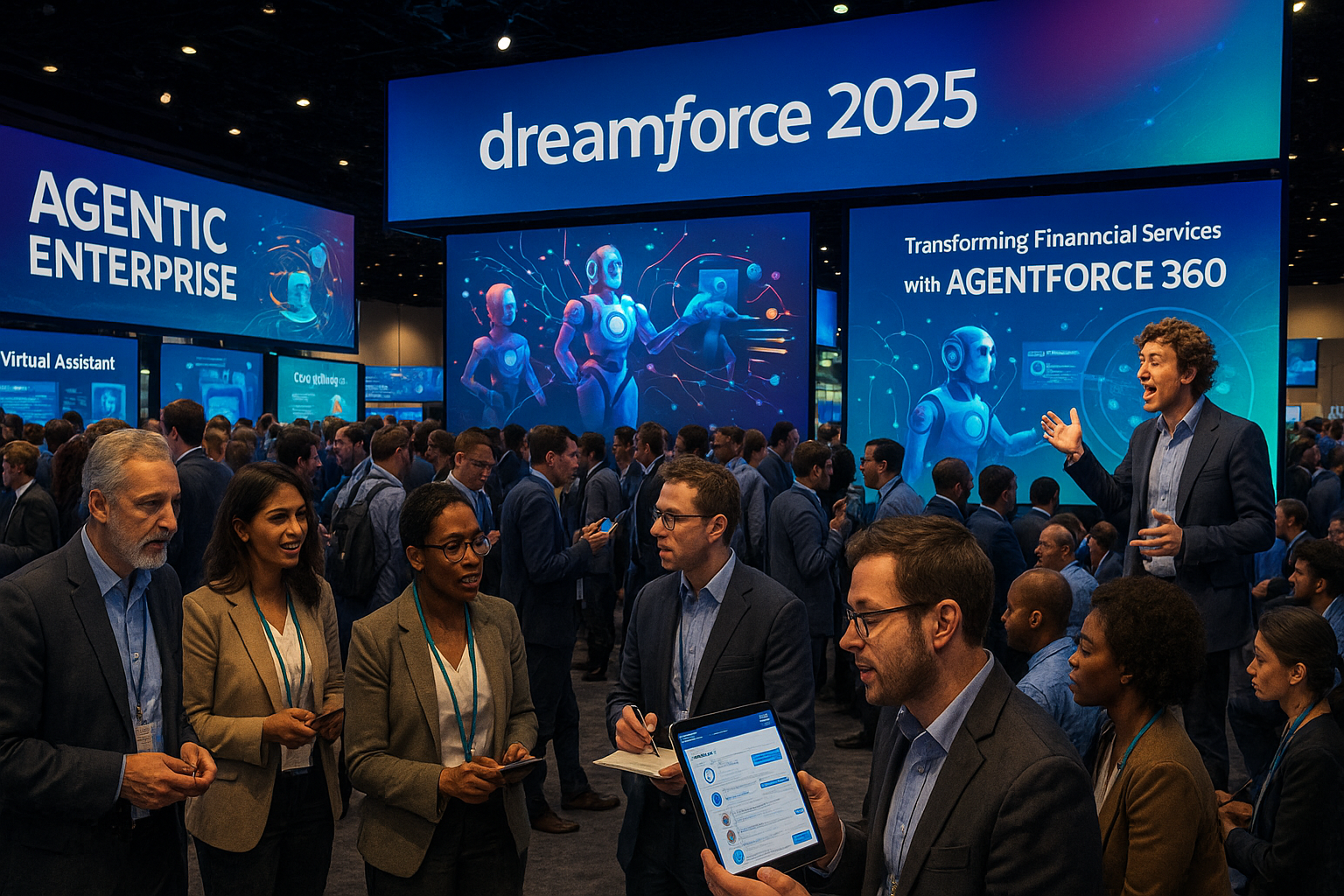
The Dawn of the Agentic Enterprise in Financial Services
How Agentforce 360 is Transforming Banking, Wealth Management, and Insurance
As I watched Marc Benioff take the stage this morning at Dreamforce 2025's main keynote, I couldn't help but reflect on how far we've come in just one year. The announcement of Agentforce 360—Salesforce's unified platform for the "Agentic Enterprise"—represents more than just another product launch. For those of us who work exclusively in financial services, this is the moment when autonomous AI agents move from theoretical possibility to practical transformation.
At Vantage Point, we've spent over a decade helping banks, wealth management firms, and insurance companies maximize their Salesforce investments. Today's Dreamforce announcement confirms what we've been telling our clients for months: the future of financial services isn't about AI replacing humans—it's about AI elevating human potential to levels we've never seen before.
What is Agentforce 360? Understanding the Agentic Enterprise
Agentforce 360 is Salesforce's most ambitious platform to date, designed to connect humans, AI agents, and data within a single, trusted ecosystem. Announced at today's Dreamforce keynote and now generally available, this platform represents the culmination of four major releases in just twelve months—from the initial Agentforce launch in October 2024 to today's comprehensive 360 solution.
But what makes this different from the countless AI announcements we've seen this year? The answer lies in Salesforce's unique definition of the "Agentic Enterprise."
The Agentic Enterprise is a collaborative model where autonomous AI agents work alongside human employees as 24/7 intelligent partners. These aren't simple chatbots or rule-based automation tools. Agentforce agents can reason, make decisions, take action across multiple systems, and seamlessly hand off to humans when needed—all while operating within strict governance and compliance frameworks that financial services demand.
Marc Benioff put it perfectly in today's keynote: "We're entering the age of the Agentic Enterprise—where AI elevates human potential like never before."
For financial services leaders, this isn't marketing hype. It's a fundamental shift in how we think about serving clients, managing risk, and scaling operations.
The Four Pillars of Agentforce 360: Built for Financial Services
Today's announcement revealed that Agentforce 360 is built on four interconnected components, each designed to address specific challenges we see every day in banking, wealth management, and insurance:
1. The Agentforce 360 Platform: Precision Control for Regulated Industries
The core platform introduced two breakthrough capabilities that immediately caught my attention as someone who works in the highly regulated financial services sector:
Agentforce Builder is a conversational development studio that allows our clients to create AI agents using natural language—no extensive coding required. During this morning's demo, we saw how a bank could build a loan officer agent in minutes, defining its behavior, connecting it to data sources, and setting compliance guardrails all in one unified workspace.
Agent Script solves one of the biggest concerns I hear from financial services CIOs: "How do we control what AI agents actually do?" This new JSON-based language enables what Salesforce calls "Hybrid Reasoning"—the ability to balance the creative flexibility of large language models with deterministic, rule-based business logic. For a wealth management firm, this means an AI agent can provide personalized investment insights while strictly following fiduciary duty requirements and compliance protocols.
This level of control is non-negotiable in financial services. Agentforce 360 delivers it.
2. Data 360: The Trusted Foundation
The Data Cloud keynote this afternoon unveiled Data 360, the evolution of Salesforce's data platform that serves as the foundation for every AI agent. Two features stand out for financial institutions:
Intelligent Context automatically extracts information from unstructured content—think loan applications, financial statements, policy documents, insurance claims, and account opening forms. In the past, preparing this data for AI analysis required extensive manual work or custom development. Now, agents can understand and act on this information natively.
Tableau Semantics translates raw data into consistent business language and metrics. For a regional bank with multiple core systems, this means AI agents can provide accurate answers about customer relationships, account balances, and transaction history without getting confused by different data schemas across systems.
The partnership announcements with Databricks, Snowflake, and dbt Labs signal that Salesforce is serious about making Data 360 the unifying layer across your entire data ecosystem—a critical requirement for financial institutions with complex, multi-vendor technology stacks.
3. Customer 360 Apps: AI Agents Embedded in Your Workflows
Rather than requiring financial services teams to learn entirely new systems, Agentforce agents live inside the Salesforce applications your teams already use:
- Agentforce for Financial Services provides role-based agents specifically designed for wealth advisors, loan officers, insurance agents, and banking relationship managers
- Agentforce Service powers 24/7 customer support for routine inquiries, fraud alerts, and account servicing
- Agentforce Sales automates prospecting, lead qualification, and opportunity management
- Agentforce Revenue Management handles quote generation, pricing optimization, and billing automation
The key insight from today's presentations: these aren't standalone tools. They're deeply integrated into Financial Services Cloud, inheriting all your existing security policies, compliance rules, and business processes.
4. Slack: The Agentic Operating System
The Slack keynote this afternoon revealed a vision I didn't expect but immediately understood: Slack as the "Agentic OS" for financial services organizations.
Imagine your wealth advisors asking questions in Slack and getting instant, accurate answers from AI agents that have access to client portfolios, market data, and compliance guidelines. Picture your loan officers collaborating with AI agents in dedicated channels, where the agent automatically pulls credit reports, calculates debt-to-income ratios, and flags applications requiring human review.
The announcement of Slack-First Apps means your teams won't need to context-switch between systems. Agents surface insights and take actions directly within the conversation flow where work actually happens.
Why This Matters for Financial Services: Real Results from Real Institutions
The most compelling part of today's keynote wasn't the product demonstrations—it was the customer success stories that proved this technology works in production environments right now.
Banking: From Weeks to Minutes
Absa Relationship Banking shared results that should get every bank executive's attention: they're resolving customer issues 88% faster with Agentforce support. Their fraud management team now operates with 24/7 AI-powered assistance, dramatically accelerating their response time to suspicious activities.
For community banks and regional institutions competing against national giants, this levels the playing field. You can now offer the same always-on, instant service that customers expect from the largest banks—without proportionally scaling your workforce.
Customer Service: The New Economics of Scale
The statistics from today's presentations tell a clear story:
- Reddit: 46% case deflection, 84% reduction in resolution time (from 8.9 minutes to 1.4 minutes)
- OpenTable: 70% of inquiries resolved autonomously with "warmth and white-glove service"
- 1-800Accountant: 90% case deflection during peak tax week
For financial services contact centers handling routine balance inquiries, lost card reports, password resets, and transaction disputes, these metrics translate directly to your P&L. Every successfully deflected case is a cost saved. Every faster resolution is a satisfaction score improved.
But here's what matters more: by automating routine inquiries, your human agents can focus on the complex, sensitive situations that truly require empathy, judgment, and relationship-building skills—the activities that drive customer loyalty and lifetime value.
Wealth Management: Augmenting Advisors, Not Replacing Them
I've spent years working with RIAs and wealth management firms, and I know the number one concern about AI: "Will it replace our advisors?"
Today's announcement makes clear that Agentforce is designed to augment, not replace, financial professionals. The Financial Advisor Agent (launching in Winter 2025) handles time-consuming administrative tasks:
- Analyzing client portfolios and identifying opportunities before meetings
- Generating meeting agendas based on life events, market changes, and financial goals
- Processing post-meeting notes and updating client plans automatically
- Creating and assigning follow-up tasks to ensure nothing falls through the cracks
This isn't about replacing the trusted advisor relationship. It's about giving advisors the gift of time—time to deepen client relationships, time to have more meaningful conversations, time to grow their practice without drowning in administrative work.
The Trust Factor: Why Financial Services Can Confidently Deploy Agentforce 360
Throughout today's sessions, Salesforce emphasized a theme that resonates deeply with every financial services leader I work with: trust.
The Einstein Trust Layer underpins every Agentforce interaction with enterprise-grade security:
- Data Encryption at rest and in transit
- Zero-Retention Agreements with AI model partners—your data never trains external models
- Audit Trails for every agent action and decision
- Field-Level Security respect—agents only see data they're authorized to access
- Toxicity Detection to filter harmful content
- PII Masking for sensitive customer information
For banks subject to FDIC examination, wealth managers under SEC oversight, and insurance companies navigating state regulations, these aren't nice-to-have features—they're prerequisites for deployment.
The observability dashboards demonstrated this afternoon provide real-time visibility into agent reasoning, accuracy rates, and compliance adherence. Your risk and compliance teams can monitor AI decisions with the same rigor they apply to human employees.
What We Learned About Implementation: The Practical Path Forward
Beyond the keynote announcements, today's breakout sessions provided valuable insights into how financial services firms are actually implementing Agentforce:
Start with High-Volume, Low-Complexity Use Cases
Every successful deployment we heard about today followed a similar pattern: identify a high-volume, relatively straightforward use case where success is easy to measure.
For banks, this might be account balance inquiries or lost card reports. For wealth management, it could be meeting prep automation. For insurance, claims status updates or policy inquiries.
The goal isn't to automate your most complex workflows on day one. It's to build confidence, demonstrate value, and establish the foundation for more ambitious applications.
Data Readiness is Everything
A common theme from today's customer presentations: the organizations seeing the fastest time-to-value are those that invested in data quality and governance before deploying agents.
Agentforce agents are only as good as the data they can access. If your customer data lives in disconnected silos, if your financial information isn't standardized across systems, if your document repositories are unstructured chaos—AI agents will struggle just like humans do.
The good news: Data 360's Intelligent Context feature can help bridge some of these gaps. But there's no substitute for clean, well-governed data.
Governance and Change Management Matter as Much as Technology
The most insightful session I attended today focused on organizational readiness. One banking executive shared a crucial lesson: "We spent so much time on the technology that we almost forgot about the people."
Deploying Agentforce means changing how your teams work. Customer service representatives need to understand when to let agents handle inquiries and when to step in. Advisors need to trust that AI-generated meeting prep is accurate. Compliance teams need new frameworks for monitoring and auditing AI decisions.
This isn't a technology project—it's a transformation initiative that requires executive sponsorship, clear communication, training, and ongoing support.
Looking Ahead: Wednesday's Deep Dive into Real-World Applications
Today's announcements laid the foundation. Tomorrow's Agentforce keynote (10:00 AM) promises to show us exactly how these capabilities translate into specific workflows across banking, wealth management, and insurance.
We'll be paying close attention to:
- Detailed demonstrations of the Financial Services agents launching in Winter 2025
- Fraud detection and AML/KYC automation capabilities
- Loan origination and underwriting applications
- Claims processing automation for insurance carriers
- Regulatory compliance and audit trail features
The Agentic Sales and Service keynotes on Wednesday afternoon should provide concrete examples of how financial services firms are deploying these capabilities in production today.
Your Next Steps: How Vantage Point Can Help
Today's Dreamforce announcements confirm what we've been telling our financial services clients: the AI revolution is here, and it's accessible to institutions of every size.
But accessibility doesn't mean simple. Successfully deploying Agentforce 360 requires:
- Strategic Planning: Identifying the right use cases that align with your business priorities and regulatory requirements
- Data Foundation: Ensuring your data is ready to power AI agents effectively
- Technical Implementation: Connecting Agentforce with your existing systems—core banking platforms, portfolio management systems, policy administration systems, and more
- Governance Framework: Establishing controls, monitoring, and compliance processes for AI operations
- Change Management: Preparing your teams to work effectively alongside AI agents
This is exactly what Vantage Point does—and why our exclusive focus on financial services matters. We understand the regulatory landscape you navigate. We know the systems you use. We've helped institutions like yours through complex transformations before.
Ready to explore how Agentforce 360 can transform your financial services organization? We'd love to help you develop a strategic roadmap tailored to your specific needs and regulatory environment.
Contact us today:
- Email: hello@vantagepoint.io
- Direct: david@vantagepoint.io
- Phone: 469-499-3400
We're here at Dreamforce all week, synthesizing insights and identifying opportunities for our clients. Stay tuned for tomorrow's post, where we'll dive deeper into the specific AI agent use cases demonstrated on Day 2.
The Agentic Enterprise era has officially begun. Let's make sure your organization is ready to lead, not follow.
David Cockrum is Founder and CEO of VantagePoint.io, a Salesforce Consulting Partner specializing in Financial Services Cloud implementations for banks, wealth management firms, insurance companies, and fintech organizations.




